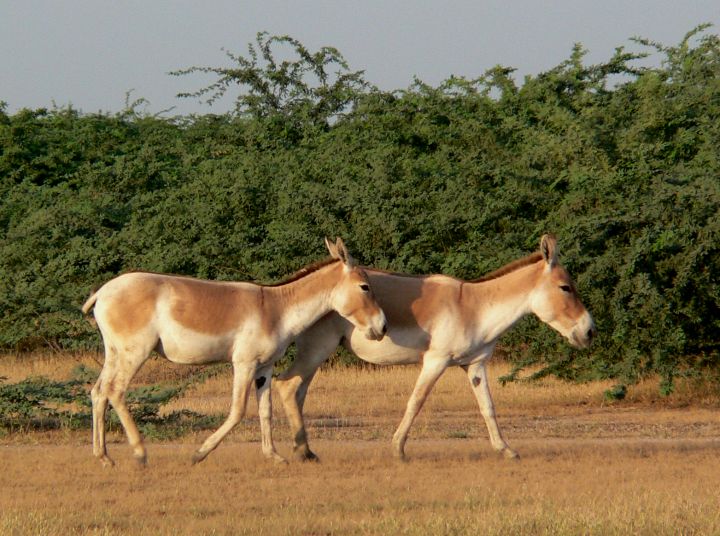Wild Ass, פרא, Equus hemionus hemippus
Back to FaunaWild Ass
פרא (pere’)
Equus hemionus hemippus
Image gallery
Biblical data
Introduction
פרא occurs 9 times in the Hebrew Bible.[1] In two of them we have the פרא in parallel to עיר (Job 11:12) or ערוד (Job 39:5) – all three assumed to reflect different kinds of wild donkeys. In other instances פרא occurs with herds (Isa 32:14) or with bull (שור, Job 6:5), which raises the question whether it belongs to the wild or to the domestic animals (as for instance in Job 39:5).
On the wild category we find the פרא as resident of the desert in Jer 2:24; 14:6; Job 24:5, and among the animals of the fields, thus the wild (Ps 104:11).
Distribution within the Bible
Prophecy, three times in judgment prophecies (Isa 32:14; Jer 2:24; 14:6).
Psalmodic literature: once (Ps 104:11).
Wisdom literature: four times in Job (6:5; 11:12; 24:5; 39:5).
Parts, Elements, Features that Are Specified in the Bible
We know of the voices the פרא sounds (Job 6:5, and possibly reflected in Isa 32:14 as well)
and his breathing in and out his nostrils (Jer 14:6)
Pairs and Constructions
פרא in parallel to שור (Job 6:5), and to עדרים (herds, Isa 32:14); and once to ערוד (Job 39:5).
End Notes
[1] Gen 16:12 והוא יהיה פרא אדם might also be counted as a metaphor?
History of Identification
Identification History Table
| Hebrew | Greek | Aramaic | Syriac | Latin | Arabic | English | |||||
| Ref | MT | LXX | Revisions | Targumim | Peshitta | Vulgate | Jewish | Christian | KJV | NRSV | NJPS |
| Isa 32:14 | משוש פראים | ὄνων ἀγρίων | [midrashic interpretation] | וחדותא לערדא
|
gaudium onagrorum
|
a joy of wild asses | A stamping ground for wild asses | ||||
| Jer 2:24 | פרה למד מדבר | ἐπλάτυνεν ἐφ᾿ ὕδατα ἐρήμου | כערדא דמדורה במדברא
|
איך ערדא דמתילף במדברא | onager adsuetus in solitudine in desiderio animae | A wild ass used to the wilderness | Or like a wild ass used to the desert | ||||
| Jer 14:6 | ופראים עמדו על שפים | ὄνοι ἄγριοι ἔστησαν ἐπὶ νάπας | וערדין קמו על נגדין
|
וערדא כמו על שבילא. | et onagri steterunt in rupibus
|
And the wild asses did stand in the high places | And the wild asses stand on the bare heights | ||||
| Hos 8:9 | פרא בודד לו | כַעֲרָד מָרוֹד בֵית יִשְׂרָאֵל | איך ערדא יחידיא | onager solitarius sibi | a wild ass alone by himself | [Like] a lonely wild ass | |||||
| Ps 104: 11 | ישברו פראים צמאם
(2) DSS (4Q86 3:6) י֯ש֯כירוׄ פראים צׄמׄאׄם [ ]. |
προσδέξονται ὄναγροι εἰς δίψαν αὐτῶν
|
יתברון ערודיא צהותהון
|
ושבעין ערדא דצהיי
|
et reficiat onager sitim suam
|
Sa‘adia to Psalms
תכסר בהא אלוחוש עטשהא
|
The wild asses quench their thirst | The wild asses slake their thirst
|
|||
| Job 6:5 | הינהק פרא עלי דשא | τί γάρ; μὴ διὰ κενῆς κεκράξεται ὄνος ἄγριος | האיפשר דמבריס מרודא עלוי דיתאה
|
דלמא מסוק ערדא על תראא
|
numquid rugiet onager cum habuerit herbam aut mugiet | Doth the wild ass braywhen he hath grass
|
Does a wild ass bray when he has grass?
|
||||
| Job 11:12 | ועיר פרא אדם יולד | βροτὸς δὲ γεννητὸς γυναικὸς ἴσα ὄνῳ ἐρημίτῃ
= a mortal human being born to a woman is equal to a desert dweller donkey |
ועילם מרודא היך בר-נש יתילד | ודגנבר עדר לאנש
|
et tamquam pullum onagri se liberum natum putat
= and just as a young wild donkey is born free to think
|
For vain man would be wise, though man be born like a wild ass’s colt | A hollow man will get understanding, When a wild ass is born a man | ||||
| Job 24:5 | הן פראים במדבר | Ἀπέβησαν δὲ ὥσπερ ὄνοι ἐν ἀγρῷ | הכדין במרודיא במדברא
|
איך ערדא במדברא
|
alii quasi onagri in deserto
|
Behold, as wild asses in the desert | Like the wild asses of the wilderness | ||||
| Job 39:5 | מי שלח פרא חפשי
ומסרות ערוד מי פתח |
ίς δέ ἐστιν ὁ ἀφεὶς ὄνον ἄγριον ἐλεύθερον= who has let a donkey free?
δεσμοὺς δὲ αὐτοῦ τίς ἔλυσεν = And why did he release its bond? |
מן פטר מרודא בר־חורי
ושׁושׁלי ערודא מן שׁארי
|
מנו שבק ערדא בר חארין
ופלט מנה נירא
|
quis dimisit onagrum liberum
= who set away a wild donkey free? et vincula eius quis solvit = and its chains who loosened?
|
Who hath sent out the wild ass free? or who hath loosed the bands of the wild ass? | Who sets the wild ass free?
Who loosens the bonds of the onager,
|
||||


